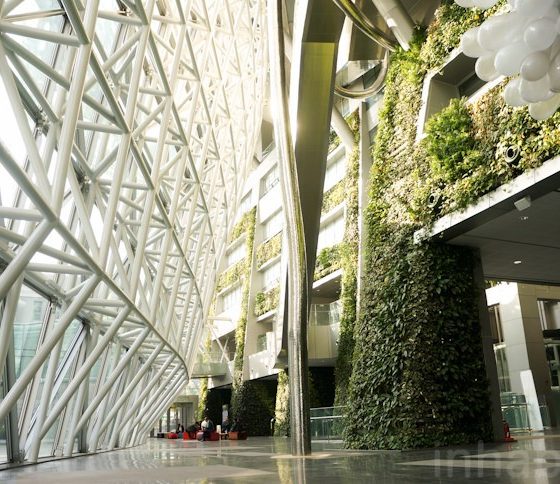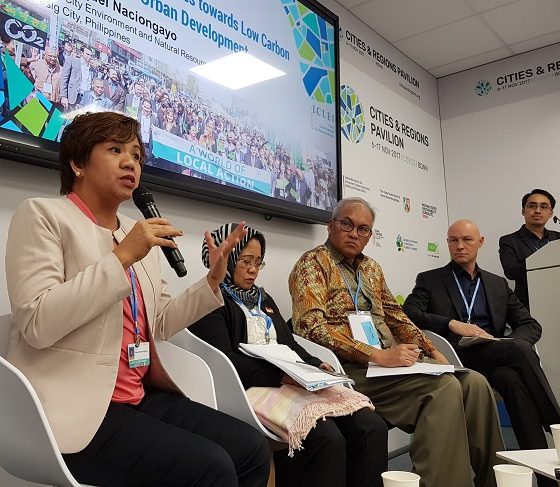Hosted by the Danish Minister for Development Cooperation and Global Climate Policy, Dan Jørgensen, the Copenhagen Climate Ministerial took place on 20th and 21st March. The programme offered an opportunity for Party and non-Party representatives to gather and discuss the 4 key climate themes: finance, mitigation, adaptation, and loss and damage as well as this year’s Global Stocktake.
The Ministerial coincided perfectly with the publication of the IPCC Sixth Assessment Report that left us all in no doubt about the urgency needed to course correct to keep the Paris Agreement on 1.5 degrees alive. While implementation was the focus of both COP 26 in Glasgow and COP27 in Sharm el Sheikh, realising a more ambitious mitigation trajectory will have to be the focus at COP28 in Dubai, in particular agreeing the phasing out of fossil fuel burning.
From a local government and municipal authorities (LGMA) perspective we know that, as the first line of defence against the impact of climate change, we play an absolutely essential role in implementing mitigation and adaptation measures as well as in responding to extreme weather incidents causing loss and damage. We also know that the fight to keep 1.5 alive will be won or lost in cities and large urban centres given their high concentration of populations and associated emissions.
Therefore, the key message from the LGMA constituency to the Parties is that national governments must include local governments in meaningful multi-level decision making talks and discussions on climate. Local governments must also be supported financially and with resources including human capital, technologies and expertise to effectively and efficiently deliver locally led and locally relevant interventions required to build resilient sustainable communities in a just and inclusive way.
While non-Party constituencies were not invited to contribute during the main plenary sessions at the Ministerial we were included in each of the four breakout sessions where key messages were emphasised and expanded upon as relevant to each theme. Overall, it was acknowledge by the plenary rapporteur that participation and local ownership between national and sub-national governments must be promoted.
Participation in the breakout sessions and the various plenaries allowed the following take aways pertinent to the road to COP28:
Finance/Loss and Damage
It is clear that a significant break through on financing not only the Loss and Damage Fund but also supports for adaptation and a just transition mitigation pathway will be needed to reach an agreement in Dubai. The Ministerial highlighted that COP27 tensions between who should fund and who should benefit from the Loss and Damage Fund remain. Some Parties proposed that current developed/developing country and historical responsibility donor base concepts and criteria were inhibiting progress. A collective and inclusive need to think outside the box and beyond was therefore required with a more current means of calculation that recognises both the current economic circumstances and current carbon footprint of Parties. Some suggested a combination of calculations underpinned by accessibility and affordability with those most impacted and in need being initially prioritised for benefit.
Also proposed was the need to explore innovative financial sources including how new levies on carbon intensive activities could be captured to add to public monies. Research and data analysis on the impact of such levies, both from a finance-raising perspective and a geo-contextualised socio-economic perspective, was encouraged.
These discussions are particularly pertinent considering the upcoming work of the Loss and Damage Transition Committee to prepare an operational template ahead of COP28 and that the Loss and Damage Fund must be new complimentary funding and should not draw on already committed funding.
The TUNGO constituency made a constructive argument in favour of developing what could be termed a climate social protection system in nations where social protections are not the norm. Such a system would particularly support access to health and unemployment benefit systems crucial to supporting community resilience and a just transition.
Overall it could be argued that the financing discussions suggested the need for a system akin to a Global Green Marshal Plan.
Mitigation
Long term, the more we reduce our carbon emissions and the more ambitious our mitigation measures are the less will be the need for financing adaptation measures as well as loss and damage supports. When considering impact, we must recognise that equity works both ways – when big emitting nations don’t pull their weight they are behaving inequitably towards those nations contributing least carbon emissions but suffering most climate impacts.
The Ministerial acknowledged that approximately a tripling of current investment was needed to scale up renewables. Also acknowledged was the need for the construction of completely new sustainable energy infrastructure systems in many countries, particularly in Africa and SE Asia.
A welcome marker was lain down by the European Union with regard to agreeing more ambitious mitigation targets though it came with an intimation that agreement on financing contributions and permutations would be contingent on such ambition.
Adaptation
While Parties acknowledged that there is some overlap between mitigation measures and adaptation measures many suggested the need to move from the abstract to the concrete and a financing of same. This was a welcome view given the key role the LGMA constituency plays on the ground with the emphasis that measures must be contextualised to the local. Also acknowledged was the significant role of technologies with some emphasising the need to democratise and support within financing models technological supports and expertise.
Global Stocktake (GST)
Given that discussion on this year’s Global Stocktake was scheduled for the last plenary rather than a breakout session where the LGMA constituency would have the opportunity to contribute I utilised the various breakout sessions to emphasise that, if appropriate data were collected, the Global Stocktake should evidence the essential climate impact role carried out my sub-national governments, their funding challenges and their various needs going forward to effectively, efficiently and inclusively mitigate, adapt and repair the impacts of climate change.
It was acknowledged by most Parties that the GST needed to deliver a clear measure with regard to the need for course correction and ultimately this would impact COP28 negotiations. Many emphasised the essential need for all Parties to contribute honestly so as to ensure a clear global picture of where all nation states are at present. Such transparency is essential to charting a pathway to keep 1.5 alive and for the reviewing of COP/UNFCCC associated work plans. Recognising the urgency, it was unsurprising that many called for the G7 and G20 groups of countries to prioritise engagement and promote same in their messaging. Ultimately, honest engagement with the GST will be a crucial factor in maintaining positive working relationships and trust during COP28 negotiations.
From a non-Party stakeholder perspective it was notable that there was an emphasis on engagement across all NPSs. However, the impression was given that there was a particular interest in ascertaining the status of sectoral emissions and co-creating a mitigation pathway with them that would ultimately contribute to the COP28 outcome agreement, thus pointing to prioritising engagement with the Business and Industry constituency. While this is understandable it would be important from an equity perspective that all NPSs be given equal opportunity to present their perspectives to the GST High Level Committee.
LGMA and COP28
Concluding with a look towards Dubai. Mention was made by several Parties that the presence of NSPs in the Blue Zone at COP28 could offer an opportunity to better engage in sectoral related discussions on the GST and towards 1.5 degree aligned mitigation road maps. While I sense that such discussions also intimated the opportunity to explore new financing sources, our strong LGMA presence in the Blue Zone cannot be ignored. Therefore, when it comes to meaningful engagement, it might be opportune for us at this COP to prioritise inviting key Party representatives to our table for multi-level debate.





